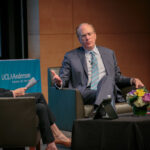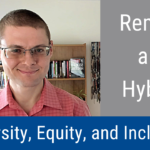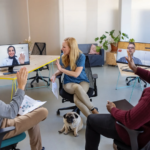Gleb Tsipursky
The Truth About Work From Home Productivity (Video & Podcast)
Work from home productivity is higher than in the office, especially on individual tasks. Since most employees prefer hybrid or remote work, a policy of flexibility helps companies maximize both retention and productivity. That's the key take-away message of this episode of the Wise Decision Maker Show, which describes the truth about work from home productivity.
Hybrid Work Policies: The Future Of The Modern Workplace
Hybrid work policies benefit companies by increasing employee engagement, productivity, retention, and diversity, but must be communicated clearly to employees. Failing to do so can harm employee retention & engagement.
Hybrid Work Training: The Key To A Successful Hybrid Workforce
Hybrid work training can increase productivity, employee engagement, job satisfaction, teamwork, and communication in a hybrid work environment. It can also address remote work challenges such as isolation, burnout, and turnover.
Remote Work Training: Unlocking The Potential Of Your Remote Team
Remote work training is essential for companies to fully realize the benefits of remote work and avoid common pitfalls, such as increased productivity, improved employee satisfaction, managing cognitive biases, cost-effectiveness and flexibility.
BlackRock CEO Is Wrong: Remote Work Productivity Reduces Inflation
BlackRock CEO Larry Fink is wrong about remote work and inflation. Remote work productivity is higher and thus reduces inflation, and other costs in remote work are lower, which also decreases inflation.
Remote and Hybrid Diversity, Equity, and Inclusion (Video & Podcast)
In order to achieve the promise of remote and hybrid diversity, equity, and inclusion, leaders need to address microaggressions in communication and the lack of sponsorship for minorities through training and mentoring programs. That's the key take-away message of this episode of the Wise Decision Maker Show, which describes how to address diversity, equity, and inclusion in hybrid and remote teams.
Why Hiring A Remote Work Consultant Is Essential For Effective Remote Work
Remote work can bring many challenges for companies, including communication issues, lack of clear guidelines, and cognitive biases. Hiring a remote work consultant can help companies navigate the complexities of remote work and ensure its success.
The Financial Advantages Of A Hybrid Work Model: A Hybrid Work Expert’s Perspective
Hybrid work models combine remote and on-site work, which allows companies to take advantage of increased productivity and reduced costs while maintaining the benefits of face-to-face interaction.
New Study Shows Managers Are Changing Their Minds About The Hybrid Work Model
Managers are recognizing the importance of the hybrid work model and organizations are becoming more open to the idea of flexible working as a long-term solution.
The Perils Of Assuming Everything Is Fine: Normalcy Bias And The Rushed Approval Of...
Despite opposition from families of crash victims, pilots' union, and a key congressman, Congress cleared the Boeing 737Max 10 jet for certification without added safety measures. The cause of the crash was a cognitive error known as normalcy bias.











